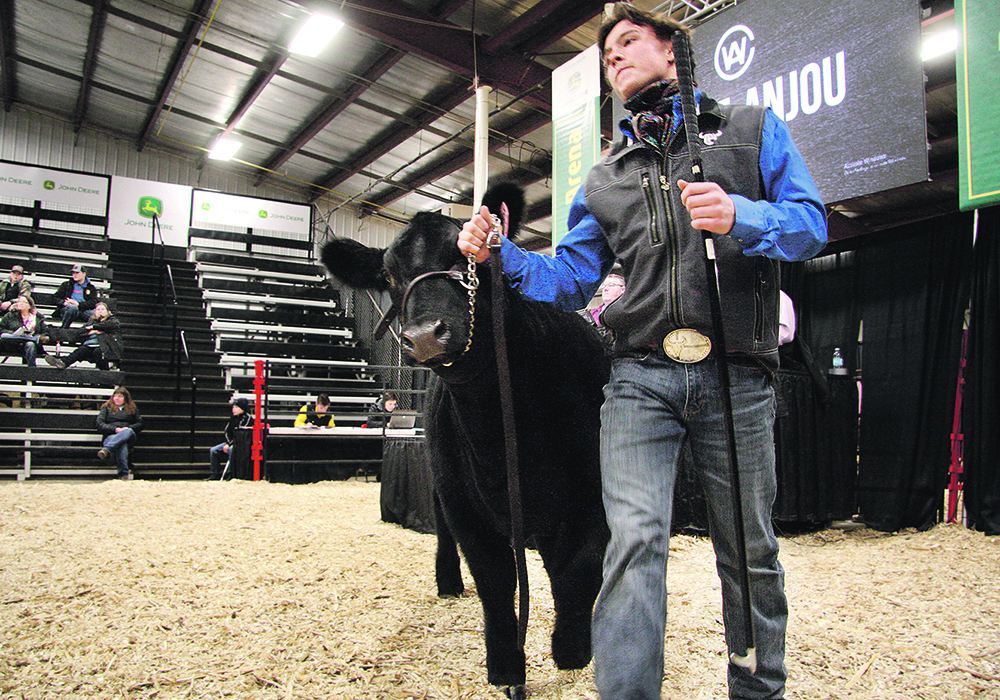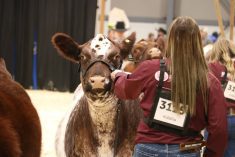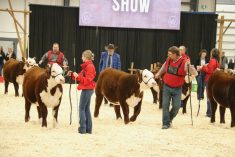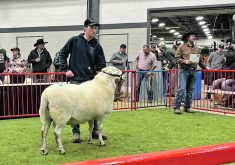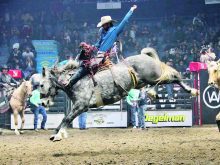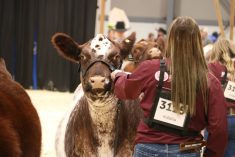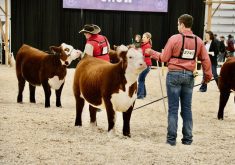Duane and Bev Ronsko’s first trip from Daysland, Alta., to Regina for Canadian Western Agribition began with an ulterior motive.
They wanted to remind two of their teenage grandchildren how great the cattle business is. The kids lost interest in 4-H during the COVID pandemic and had stopped attending.
So, they involved Weston and Tianne Wideman in preparing cattle for Edmonton’s Farmfair, held Nov. 9-12, and then for the Nov. 28-Dec. 3 Agribition event, where they realized they had good quality Maine Anjou on their hands.
Read Also
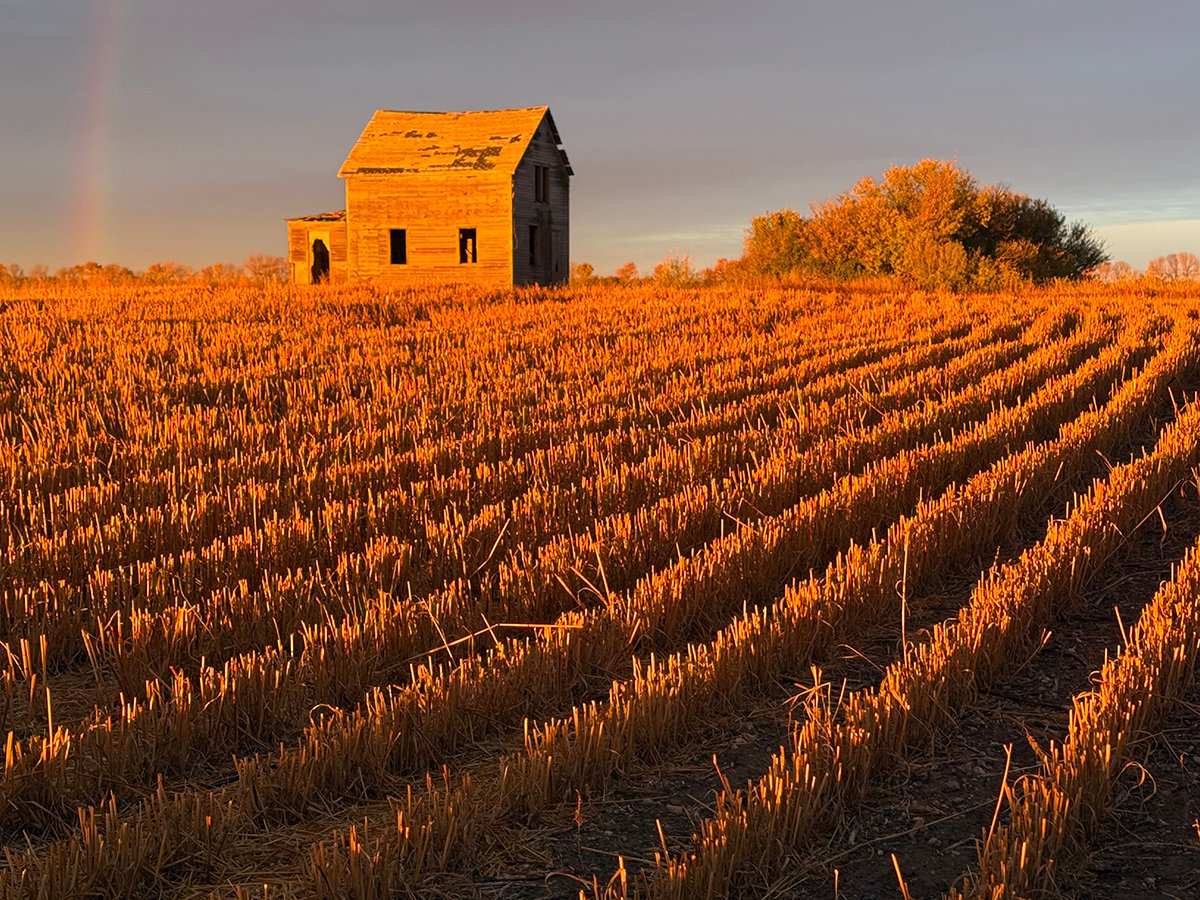
Forecast leans toward cooling trend
July saw below average temperatures, August came in with near to slightly above average temperatures and September built on this warming trend with well above average temperatures for the month.
That was confirmed when their heifer calf, Miss Ronsko JOR60K, topped the sale at $12,750. She sold to Emily Yaremko from Carpathian Land and Livestock at St. Paul, Alta., who plans to show the calf in 4-H and junior shows this coming year.
“She’s more my style of calf,” said Yaremko. “She’s deep bodied with a lot of spring and rib. She is structurally correct and will fit in my herd.”
Yaremko owns about a dozen purebred animals already and is using American genetics to build.
“I’m trying to revive it,” she said of Maine Anjou as a breed. “They have a lot of hip and hair and are so easy to have in your herd.”
Maines offer both milk and meat characteristics, she added, and gain well to finish.
The Ronskos got into Maines after running Pinzgauer cattle in the 1980s.
“I had Pinzgauers and I crossed them with a Texas Longhorn, which gave them a white tail,” said Duane. “We did really well. We won in Calgary, grand champion, in 1989 but I still couldn’t sell a bull.”
The 2002 drought forced a complete sell-off, but he later bought 20 prime Angus heifers and a purebred Maine bull and began working his way up in percentage.
“We bought the very best bulls we could find,” he said. “Now we have 70 cows.”
Bluesky Maines, which uses the same name as the Ronsko’s trailer manufacturing and refurbishment businesses, sold bulls privately until holding its first online sale last year.
“I figured I had better start promoting them,” Duane said.
For an outfit that had never been to a breed sale or Agribition, he was pleased with the response.
“I went to the (annual general meeting) for the first time ever this summer,” he said. “They were having a hard time getting people to commit to Agribition so I said I guess I could put two in to help you out.”
The night before leaving to drive to Regina, he was painting trailers until 1:30 a.m. because the two other businesses need attention, too. The Ronskos have only two employees, compared to the 13 they used to have, because they can’t find workers and that leaves Duane to do all the painting.
“I’m only 70,” he laughed.
Having the high seller is just a bonus, he said. The real value in the trip was working with their grandchildren. In fact, Tianne was so ill with the flu that she didn’t make the initial trip and her grandparents flew her out when she was feeling better. She was there in time for the show.
“She wanted to be here so bad,” said Duane. “And I’m a softy.”
The Ronsko heifer was named reserve champion female behind Miss Rusylvia 7J from Rusylvia Cattle Co. at Derwent, Alta.
Rusylvia also showed the grand and reserve champion bulls, Mr Rusylvia We Deliver 39J and Mr Rusylvia 68K.
The sale totalled $125,950 on 33 lots, including embryos and semen, to average $3,817.
In the junior Beef Extreme, Yaremko’s Maine calf, Carps Harleys Whsky Kraze 248K, won her class.
A Simmental calf exhibited by Brant Wallgren from Wallgren Farms at Edgerton, Alta., was named extreme champion. A Charolais, Elder’s Design 117J, exhibited by Cassidi Elder from Elder Charolais at Coronach, Sask., was the reserve.
Meanwhile, Yaremko’s brother, Kyle, won the Canadian National 4-H Youth Judging competition and went on to judge the First Lady Classic. Yaremko is currently studying at Northern Oklahoma College.


